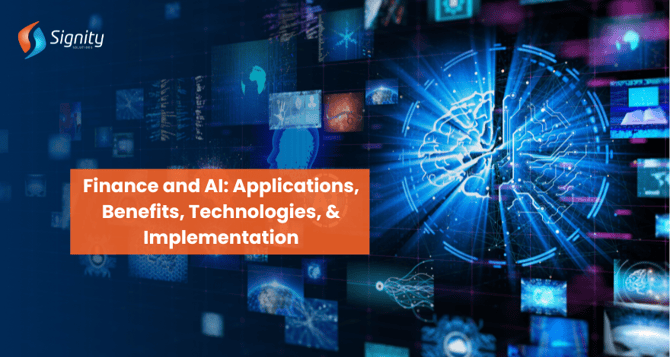Finance and AI: Applications, Benefits, Technologies, & Implementation
In order to ensure risk-free and robust services, it has become imperative for fintech businesses to implement the best AI strategies. Wondering how it can help you? Check out the applications of AI finance for regulatory compliance, its advantages, technologies, and steps to implement it.

The fintech industry is facing numerous challenges, from rapidly changing regulations to the growing complexity of compliance processes. Traditional approaches in the finance market often need more efficiency to tackle such tasks.
This gap leaves the organizations vulnerable to penalties, operational inefficiencies, and reputational risks. Hence, AI finance has become a necessity to avoid such situations.
For instance, as an AI fintech development company, we build custom solutions for businesses to overcome their specific challenges.
This blog will help you explore finance AI applications, their benefits, AI technologies, and steps to implement them.
Key Takeaways
- AI in finance automates fraud detection, KYC, and real-time monitoring for efficient regulatory adherence.
- Finance AI cuts costs, improves onboarding, ensures privacy, and boosts efficiency.
- Tools like NLP, machine learning, and RPA streamline compliance and risk management.
- Successful AI adoption in fintech requires readiness assessment, gap analysis, pilot projects, and a focus on ethical practices.
Applications of Compliance AI in Finance
Artificial Intelligence in finance plays a crucial role in automating complex processes. Some of its applications can be seen below:
The image above shows that as of 2024, 58% of finance organizations have already started using AI.
-
AI-Based Screening
One of the biggest applications of finance AI is that it enhances the screening process by comparing customer or business data against global sanction lists and politically exposed persons (PEP) databases. It ensures rapid identification of high-risk entities and minimizes manual errors. AI helps financial institutions efficiently maintain compliance with regulatory standards.
-
KYC (Know Your Customer) Verification
AI also automates the KYC process by verifying customer identities using advanced image recognition and document validation. It reduces the time and effort needed for manual checks to ensure a smoother onboarding experience. It further improves compliance with AML and other regulations while improving accuracy.
-
RegTech Solutions
RegTech solutions leverage AI to simplify compliance with complex financial regulations by automating repetitive processes. These AI-powered tools provide real-time monitoring, reporting, and adaptation to changing regulations. By reducing manual intervention, RegTech ensures better accuracy and cost-efficiency.
-
Automated Document Analysis and Validation
AI-powered tools analyze compliance-related documents, extracting and validating critical data. These tools eliminate manual errors and ensure that all documentation meets regulatory standards. This automation saves time and ensures compliance consistency across operations.
-
Regulatory Text Analysis
AI tools analyze and interpret complex regulatory texts, extracting actionable insights for businesses. These insights help institutions implement necessary changes and stay updated with compliance requirements. It simplifies regulatory understanding and improves operational agility.
-
Automated Transaction Monitoring
AI detects unusual patterns in transactions, flagging suspicious activities like money laundering or fraudulent transfers. By continuously learning, these systems improve their ability to identify new risks. It ensures timely reporting and enhances compliance with AML requirements.
-
Behavioral Analytics
AI examines customer and employee behavior to identify anomalies, such as unusual spending or login patterns. These insights help financial institutions detect potential fraud or insider threats. Behavioral analytics provide a proactive approach to compliance and risk management.
-
Compliance Monitoring
AI monitors and evaluates compliance processes across an organization, identifying gaps in real time. It sends alerts when deviations occur, ensuring timely corrective actions. Its continuous oversight strengthens adherence to ever-evolving regulations.
-
Fraud Detection and Prevention
AI systems analyze transaction data, user behavior, and historical fraud patterns to detect and prevent fraudulent activities. These tools can flag risks early, protecting businesses from financial and reputational damage. Fraud detection with AI supports compliance by mitigating risks effectively.
-
Regulatory Compliance Workflow
AI automates the end-to-end regulatory compliance workflow, from risk assessments to generating reports like Suspicious Activity Reports (SARs). It helps streamline processes and ensures accuracy, assisting organizations to maintain compliance effortlessly. It also reduces the burden on compliance teams.
Also Read: Learn more about the role of AI in financial businesses. Check out our comprehensive blog for detailed information.
Financial Compliance and AI- Its Biggest Benefits
Did you know that about 73% of companies waste time on manual tasks that can be easily automated by AI? This is just one benefit. Some of the major advantages of AI finance includes:

-
Automation of Compliance Reporting
AI helps streamline compliance reporting by automating data collection, analysis, and report generation, reducing manual effort and errors. It guarantees timely and accurate submissions to regulatory authorities.
-
Cost Reduction
Finance AI solves one of the biggest challenges for businesses-saving costs. By automating repetitive tasks and minimizing manual intervention, AI significantly lowers compliance costs. Institutions save resources while maintaining high regulatory standards.
-
Improved Customer Experience
AI enables smoother compliance processes, such as quicker KYC verification, enhancing customer onboarding and satisfaction. It further guarantees secure and seamless interactions throughout the customer journey.
-
Enhanced Data Privacy
AI-powered systems prioritize data privacy by ensuring secure storage, processing, and sharing of sensitive information. It helps financial institutions comply with stringent data protection regulations.
-
Reduction of False Positives
Machine learning algorithms improve the accuracy of risk detection systems, reducing the number of false positives in fraud and compliance alerts. It also minimizes unnecessary investigations and improves resource allocation.
-
Operational Efficiency
AI boosts operational efficiency by automating routine compliance tasks and streamlining workflows. Hence, teams can focus on strategic decision-making while maintaining robust regulatory adherence.
-
Real-Time Monitoring and Predictive Analytics
AI provides real-time monitoring of transactions and uses predictive analytics to anticipate potential compliance breaches. This proactive approach enhances risk mitigation and ensures timely interventions.
-
Improved Regulatory Compliance and Risk Mitigation
AI strengthens regulatory compliance by adapting quickly to changing laws and standards. It helps mitigate risks by identifying vulnerabilities and ensuring adherence to updated regulations.
AI Technologies in Financial Regulatory Compliance
AI technologies play a crucial role in financial regulatory compliance. Various tech enhances the accuracy and adaptability of compliance with regulations. Some of the key AI technologies in financial compliance include:

-
Natural Language Processing (NLP)
One of the most crucial AI technologies in financial compliance is the NLP. It helps analyze regulatory texts, compliance policies, and legal documents to extract key obligations and ensure alignment with laws.
Further, Natural Language Processing also helps finance organizations to interpret and act on complex regulations efficiently to reduce manual efforts.
-
Machine Learning (ML)
Machine Learning is another tech that plays an important role in finance and AI. The ML algorithms identify patterns in historical and real-time financial data to detect anomalies and fraudulent activities.
It continuously improves through training to enhance the accuracy of risk detection and compliance monitoring.
-
Robotic Process Automation (RPA)
RPA helps finance institutions automate repetitive tasks like gathering, validating, and submitting compliance reports. It reduces human intervention, minimizes errors, and guarantees faster regulatory processes.
RPA is trained to follow predefined workflow and mimic human actions like data entry, document processing, and report generation for better accuracy.
-
AI-Powered Risk Assessment Tools
Risk assessment tools are very pivotal in the finance industry. These tools help evaluate risks in transactions, customer profiles, and operational activities using real-time and historical data.
Further, AI-powered risk assessment tools help prioritize high-risk cases for further review by compliance teams.
-
Computer Vision
Computer vision technology identifies tampered or falsified documents by analyzing images and patterns. It is commonly used to verify identity documents during onboarding and audit processes.
Leveraging advanced image recognition ensures the authenticity of documents with high precision, helping reduce the risk of fraud and strengthening trust in compliance procedures.
-
Chatbots and Virtual Assistants
Chatbots and virtual assistant tools provide instant assistance to employees and customers by answering their compliance-related questions. These also help deliver training on new regulations to improve overall awareness.
With 24/7 availability, they ensure timely support for compliance inquiries, minimizing delays. They can be customized to handle multilingual queries, making them accessible to global teams.
-
AI-Powered Identity Verification Processes
AI-powered identity verification processes use advanced algorithms to authenticate user identities by analyzing documents, biometric data, and other credentials. These systems quickly detect inconsistencies and fraud by cross-referencing data with trusted databases.
The identity verification tools also enhance security, streamline onboarding, and ensure compliance with regulatory requirements like KYC and AML.
Implement the Right AI Finance for Regulatory Compliance
Ensure seamless compliance, reduced risks, and enhanced efficiency with tailored AI solutions.
Implementing AI Finance for Regulatory Compliance
As discussed in the sections above, finance AI benefits businesses in several ways, making the process easy and robust. Hence, fintech companies should integrate AI technologies quickly. Here is your step-by-step guide to implementing AI in financial regulatory compliance:
-
Assessing Organizational Readiness for AI Adoption
The first step in implementing AI finance for regulatory compliance is to begin by evaluating your organization’s technological infrastructure, workforce skills, and overall readiness. This step ensures a strong foundation for AI-driven compliance solutions.
-
Gap Analysis and Developing an AI Strategy
Once you are aware of your needs, conduct a compliance gap analysis to identify vulnerabilities and inefficiencies. These insights can then be used to develop a tailored AI compliance strategy, outlining goals, data sources, and key focus areas like fraud detection.
-
Understanding the Current Regulatory Stance on AI
The next step for building compliance with AI in fintech is to review existing regulations and guidelines related to AI in compliance to ensure solutions meet legal standards. Further, staying up-to-date with the regulatory stance helps avoid penalties and ensures ethical AI adoption.
-
Pilot Projects and Automated Compliance Monitoring
Next, launch pilot projects to test AI tools in specific areas like anomaly detection and reporting. You can also use the outcomes to refine the systems and scale AI solutions to automate compliance monitoring across the organization.
-
Continuous Compliance Monitoring and Measuring KPIs
The fifth step is to implement AI systems capable of evolving with regulatory changes for continuous compliance monitoring. Track Key Performance Indicators (KPIs) like detection accuracy and cost efficiency to evaluate and improve AI tools’ performance.
-
Change Management and Staff Training
Next, facilitate the smooth adoption of AI through change management strategies and comprehensive staff training. Equip your employees with the knowledge to use AI tools effectively and align workflows with new technologies.
-
Addressing High Implementation Costs and Scaling Solutions
Acknowledge and plan for the high costs of AI adoption, including technology, infrastructure, and training. Scale successful solutions strategically to balance expenses with long-term benefits in regulatory compliance.
Ethical Consideration in AI-Driven Compliance
To preserve integrity and confidence in the fintech sector, ethical considerations in AI-driven financial compliance are crucial. Addressing algorithmic bias is necessary to ensure fairness and nondiscrimination since it can result in unfair outcomes, particularly during decision-making processes.
Organizations can better connect their AI practices with ESG records and wider society ideals by implementing ethical frameworks and norms.
Robust data governance procedures and moral data use guarantee adherence to privacy norms while preserving openness in AI decision-making. AI accountability is essential, necessitating transparent monitoring procedures to keep an eye on systems and preserve moral principles. Using human judgment when making important decisions reduces the hazards that come with complete automation.
Future Trends in AI for Financial Compliance
Advanced RegTech solutions that combine blockchain technology with AI for improved security and traceability are the way of the future for AI in financial compliance. Predictive analytics and risk forecasting will be powered by deep learning and machine learning models, allowing for proactive compliance management and breach prediction.
Transparency will be improved via Explainable AI (XAI), which will make AI judgments more comprehensible and reliable. While continuous learning systems will adjust to changing regulations and market trends, emerging cross-border compliance solutions will simplify global regulatory conformity. When combined with trend analysis, these advances have the potential to transform financial compliance in a precise and efficient manner.
Develop the Best Finance AI Tools for Your Business Growth
With our experts at Signity, you get access to custom AI financial compliance solutions to ensure that they meet your business requirements. With years of experience in the industry, we have helped global clients in the fintech industry get just the right solution.
Connect with our AI experts today and get a free quote for your solution.
----------------------------------------------------------------------------------
Frequently Asked Questions
Have a question in mind? We are here to answer. If you don’t see your question here, drop us a line at our contact page.
What are the benefits of AI in finance?
![]()
The benefits of AI in finance include enhanced customer experience, improved fraud detection, personalized financial services, efficient data analysis, streamlined operations, and increased security.
What are the applications of Artificial Intelligence in accounting and finance?
![]()
Applications of Artificial Intelligence in accounting and finance encompass automation of routine tasks, real-time data analysis, predictive analytics for decision-making, fraud detection, enhanced audit and compliance processes, and personalized client interactions.
How is AI used in loan applications?
![]()
AI is used in loan applications to automate document processing, analyze borrower creditworthiness through data analytics, streamline approval workflows, and enhance fraud detection, resulting in faster and more accurate lending decisions.
What is the role of AI in the finance industry?
![]()
AI in finance automates complex tasks like fraud detection, regulatory compliance, risk assessment, customer service, and predictive analytics. It enhances accuracy, reduces manual errors, and streamlines operations.
Which AI technologies are commonly used in financial compliance?
![]()
Technologies include Natural Language Processing (NLP), Machine Learning (ML), Robotic Process Automation (RPA), Computer Vision, and AI-powered risk assessment tools.





